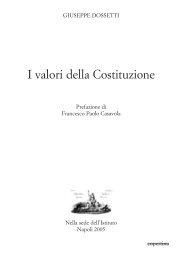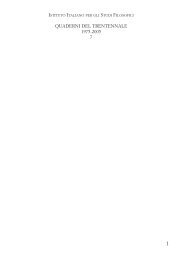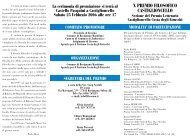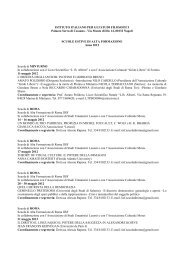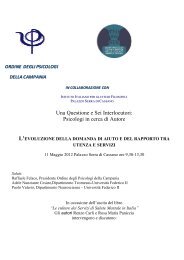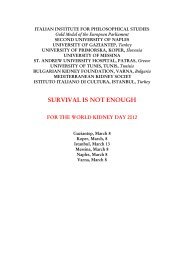- Page 1:
ISTITUTO ITALIANO PER GLI STUDI FIL
- Page 4 and 5:
A cura di MARIASOLE FANUZZI, ANTONI
- Page 6 and 7:
più consapevole dello stesso Adam
- Page 9 and 10:
MEZZOGIORNO E INTERMEDIAZIONE “IM
- Page 11 and 12:
isogno di politiche sue proprie e c
- Page 13 and 14:
continuo” di un racconto che ha p
- Page 15 and 16:
SVIMEZ nel suo Rapporto del 1990, c
- Page 17 and 18:
Sommessamente, e senza auspicarne l
- Page 19 and 20:
il punto centrale della debolezza d
- Page 21 and 22:
struttura e di sviluppo fra le dive
- Page 23 and 24:
seguente ad un contratto (saggio di
- Page 25 and 26:
economisti, sociologi, politologi,
- Page 27 and 28:
organizzazione e ricorso al crimine
- Page 29 and 30:
7. INEFFICIENZE DI SISTEMA E DIFFUS
- Page 31 and 32:
intende innovare i termini della su
- Page 33 and 34:
presa resta come un centro isolato
- Page 35 and 36:
il nostro orgoglio intellettuale. M
- Page 37 and 38:
Queste cose servono qualche volta p
- Page 39 and 40:
tata di mano, ma è anche da rifiut
- Page 41 and 42:
I mercati efficienti sono tali in q
- Page 43 and 44:
itiene non un modo per ottenere un
- Page 45 and 46:
primo luogo a questa classe dirigen
- Page 47 and 48:
Partirei da due ipotesi: 1) nel Mez
- Page 49 and 50:
Non sono in grado di dire se la soc
- Page 51:
in primo luogo, di chi è comunque
- Page 54 and 55:
ché la società vive nella paura d
- Page 56 and 57:
a riecheggiare il detto che, alle p
- Page 58 and 59:
A ciò impegna, infine, il 41° art
- Page 60 and 61:
egole valide per tutti è instabile
- Page 62 and 63:
Dismessa la “regola morale” del
- Page 64 and 65:
La vasta diffusione dell’uso di q
- Page 66 and 67:
data la necessità di mantenere occ
- Page 68 and 69:
ad impegnative gare d’appalto in
- Page 70 and 71:
qua, è lui che mi dà il terreno p
- Page 72 and 73:
vanile si era contratto piú rapida
- Page 74 and 75:
promettono la libera determinazione
- Page 76 and 77:
ottiene la promessa di voti «in ca
- Page 78 and 79:
liche ed in particolare per le stes
- Page 80 and 81:
anni ’80, attrezzandosi di conseg
- Page 82 and 83:
lità organizzata, sia per la diffi
- Page 84 and 85:
sico” e del dibattito sul Mezzogi
- Page 86 and 87:
allarga subito e coerentemente alla
- Page 88 and 89:
società» si va sostituendo la «m
- Page 90 and 91:
clientelismo e corruttela. Intorno
- Page 92 and 93:
La scandalosa vicenda del dopo terr
- Page 94 and 95:
Mario Pagano e della loro teorizzaz
- Page 96 and 97:
ceno comprende che una delle caratt
- Page 98 and 99:
gimento italiano che, liberato dall
- Page 100 and 101:
costume e della morale, della perdi
- Page 102 and 103:
giura sui simboli dei vecchi comuni
- Page 104 and 105:
104
- Page 106 and 107:
menti interni, un altro per il comm
- Page 108 and 109:
sua influenza sullo sviluppo econom
- Page 110 and 111:
esse collegati, forniscono lavoro a
- Page 112 and 113:
112
- Page 114 and 115:
LA TEORIA DI SRAFFA DELL’ECONOMIA
- Page 116 and 117:
CLASSI SOCIALI E CONFLITTI D’INTE
- Page 118 and 119:
L’HANSA: UNA COMUNITÀ ECONOMICA
- Page 120 and 121:
L’EUROPA VERSO IL 1992 (in collab
- Page 122 and 123:
PROBLEMI DEL DEBITO ESTERO DEI PAES
- Page 124 and 125:
LA CRIMINALITÀ ECONOMICA NELLO SPA
- Page 126 and 127:
I BAMBINI COME INDICATORE ECONOMICO
- Page 128 and 129:
LA CRESCITA DEI PAESI DEL TERZO MON
- Page 130 and 131:
ALL’ECONOMIA POLITICA, Napoli, 21
- Page 132 and 133:
mento di Diritto dell’Economia de
- Page 134 and 135:
versità di Torino), J.D. Hey (Univ
- Page 136 and 137:
vincia di Napoli), G. Lambiase (Ass
- Page 138 and 139:
zio Visco (Banca d’Italia), Chris
- Page 140 and 141:
cida), Gregorio Rubino (Università
- Page 142 and 143:
NEGOZIATA (in collaborazione con la
- Page 144 and 145:
L’ETICA NELL’ECONOMIA (in colla
- Page 146 and 147:
zioni di: Teresa Valerio (President
- Page 148 and 149:
CORE COMPETENCIES, DIVERSIFICATION
- Page 150 and 151:
ECONOMIA CRIMINALE E SISTEMA FINANZ
- Page 152 and 153:
2000. Relazioni di: Antonio Bassoli
- Page 154 and 155:
Jamal Qaddorah, Mohammad Saady, Ele
- Page 156 and 157:
NEW VIEWS ON THE INDUSTRIAL REVOLUT
- Page 158 and 159:
DEMOCRAZIA, MODERNITÀ E NEOCONSERV
- Page 160 and 161:
FRONTIERES FERMEES, FRONTIERES OUVE
- Page 162 and 163:
degli Storici dell’Economia e con
- Page 164 and 165:
L’EURO E IL SISTEMA MONETARIO INT
- Page 166 and 167:
AUTO AIUTO: UNA RISPOSTA LOCALE, UN
- Page 168 and 169:
ESPERIENZE INNOVATIVE PER LA CONFIG
- Page 170 and 171:
ECOGESTIONE DELLE STRUTTURE RICETTI
- Page 172 and 173:
Costanzo (Presidente Associazione T
- Page 174 and 175:
LA PIANIFICAZIONE TERRITORIALE PROV
- Page 176 and 177:
LA POLITICA MONETARIA NELL’UNIONE
- Page 178 and 179:
Centro Studi Giambattista Vico di V
- Page 180 and 181:
CELEBRAZIONE PER IL 250° ANNIVERSA
- Page 182 and 183:
zione con l’Associazione Polis. 9
- Page 184 and 185:
ORGANIZZAZIONE MONDIALE PER LE MIGR
- Page 186 and 187:
LA SALVEZZA DELLA CAMPANIA: L’IMP
- Page 188 and 189:
L’ARGENTINA NON VUOLE PIÙ PIANGE
- Page 190 and 191:
ino, Renate Siebert, Maurizio Brauc
- Page 192 and 193:
Roma, 7 maggio 2007. Relazioni di:
- Page 194 and 195:
LA TRASFORMAZIONE DEL SUD DOPO LA S
- Page 196 and 197:
DOSSIER IMMIGRAZIONE 2008-XVII RAPP
- Page 198 and 199:
«ECOLOGISTI» IN ITALIA - SVILUPPO
- Page 200 and 201:
Michele Scudiero (Preside della Fac
- Page 202 and 203:
ini (Università degli Studi di Nap
- Page 204 and 205:
Pugliese, Alfredo Reichlin, Adriano
- Page 206 and 207:
Davis, Piero Del Negro, Vittorio Cr
- Page 208 and 209:
R. Wright, J. Heleno Faro, J. Werne
- Page 210 and 211:
D. Balkenborg, S. Demichelis, W. Le
- Page 212 and 213:
Brancaccio, Massimo D’Alema, Marg
- Page 214 and 215:
LE AREE URBANE E LO SVILUPPO DELLA
- Page 216 and 217:
216
- Page 218 and 219:
218
- Page 220 and 221:
Si manifestano in una inversione ne
- Page 222 and 223:
dall’operaio che deve dialogare c
- Page 224 and 225:
LA RIFLESSIONE FILOSOFICA SUI PROBL
- Page 226 and 227:
di Pescocostanzo “Ottavio Colecch
- Page 228 and 229:
STATO ED ECONOMIA IN SILVIO SPAVENT
- Page 230 and 231:
L’ECONOMIA POSTUNITARIA. In colla
- Page 232 and 233:
IL NOVECENTO: ECONOMIA E POLITICA.
- Page 234 and 235:
Calabria. Scuola di Cosenza, 20-24
- Page 236 and 237:
UNA SECONDA GUERRA DEI TRENT’ANNI
- Page 238 and 239:
LAVORO E NON-LAVORO TRA MERCATO GLO
- Page 240 and 241:
EMIGRAZIONE E INTERCULTURALITA: GLI
- Page 242 and 243:
FEDERALISMO EUROPEO E EUROPEISMO TR
- Page 244 and 245:
DISOCCUPAZIONE E POLITICHE OCCUPAZI
- Page 246 and 247:
UN’ANALISI GEO-STORICA E GEO-POLI
- Page 248 and 249:
Diano, l’Amministrazione Provinci
- Page 250 and 251:
DA ZAPATA AI NEOZAPATISTI OVVERO IL
- Page 252 and 253:
8-11 ottobre 2001. Relatore: Luigi
- Page 254 and 255:
IL GOVERNO DELLE RISORSE IDRICHE TR
- Page 256 and 257:
DEMOCRAZIA E MERCATO. In collaboraz
- Page 258 and 259:
OMBUDSMAN E DEMOCRAZIA. In collabor
- Page 260 and 261:
ECONOMIA ETICA ECOLOGIA. In collabo
- Page 262 and 263:
della Versilia-Pietrasanta, 31 agos
- Page 264 and 265:
264
- Page 266 and 267:
266
- Page 268 and 269:
Nella capitale del Regno, in questo
- Page 270 and 271:
tista Vico; a Brienza Francesco Mar
- Page 272 and 273:
I PROCESSI STORICI E LA COMUNITÀ L
- Page 274 and 275:
IL XX SECOLO. In collaborazione con
- Page 276 and 277:
Scientifico Statale “T. Livio - E
- Page 278 and 279:
Brienza, 6-8 marzo 1997. Relatore:
- Page 280 and 281:
Guarasci”. Cosenza, 23 maggio 199
- Page 282 and 283:
II», l’Università Popolare “F
- Page 284 and 285: MONDIALIZZAZIONE E STATO SOCIALE A
- Page 286 and 287: collaborazione con il Liceo Scienti
- Page 288 and 289: LE INNOVAZIONI NEL SETTORE DEI MATE
- Page 290 and 291: POSSIBILI PROSPETTIVE DI SVILUPPO D
- Page 292 and 293: Flacco”. Castellaneta, 30 marzo 2
- Page 294 and 295: IL TURISMO NEL TERRITORIO PICENTINO
- Page 296 and 297: gennaio 2008. Relazioni di: Ciprian
- Page 298 and 299: IL TURISMO E LA SCOPERTA DEL SUD. I
- Page 300 and 301: tis” e con il Liceo Scientifico S
- Page 302 and 303: 302
- Page 304 and 305: 304
- Page 306 and 307: (mostre storico-documentarie, mostr
- Page 308 and 309: AI CONFINI DELLA CITTÀ: IL RECUPER
- Page 310 and 311: 310
- Page 312 and 313: 2. Ricostruire momenti, periodi, se
- Page 314 and 315: First Industrial Revolutions. Edite
- Page 316 and 317: 316
- Page 318 and 319: are o imporre un livello rigido del
- Page 320 and 321: 320
- Page 322 and 323: This lecture will deal primarily wi
- Page 324 and 325: and so is a random variable. Thus,
- Page 326 and 327: esources to invest in a portfolio o
- Page 328 and 329: This result in fact holds when the
- Page 330 and 331: tely to l. If R is then changed to
- Page 332 and 333: References [1] P. Aghion, P. Howitt
- Page 336 and 337: The variables in this calculus are
- Page 338 and 339: argued that there were none at all.
- Page 340 and 341: are unemployed workers willing to w
- Page 342 and 343: capacity push wages and prices down
- Page 344 and 345: according to which unemployment ari
- Page 346 and 347: Incontro con Kenneth J. ARROW. Edit
- Page 348 and 349: 348
- Page 350 and 351: soprattutto nella materia monetaria
- Page 352 and 353: tassi di interesse, ostacolava il c
- Page 354 and 355: ficatori, egli contrappone le leggi
- Page 356 and 357: Serra era perfin cauto nel conceder
- Page 358 and 359: Giuseppe Maria GALANTI Elogio stori
- Page 360 and 361: 360
- Page 362 and 363: 362
- Page 364 and 365: Firenze, per studiarvi le relative
- Page 366 and 367: galantiano, non sono state realizza
- Page 368 and 369: 368
- Page 370 and 371: 370
- Page 372 and 373: A questa ricognizione di un decisiv
- Page 374 and 375: Industriale Partenopea non è casua
- Page 376 and 377: particolare drammaticità della cri
- Page 378 and 379: qui presentati unitariamente in qua
- Page 380 and 381: misure adottate da questo monarca a
- Page 382 and 383: coli e le finalità che sottesero l
- Page 384 and 385:
degli interessi, dei rapporti di fo
- Page 386 and 387:
Luigi DE MATTEO Governo, credito e
- Page 388 and 389:
388
- Page 390 and 391:
390
- Page 392 and 393:
Enterprise and Labour, From Eightee
- Page 394 and 395:
The First Industrial Revolutions. E
- Page 396 and 397:
396
- Page 398 and 399:
398
- Page 400 and 401:
stevano statistiche dei tassi dell
- Page 402 and 403:
Pasquale SARACENO Il nuovo meridion
- Page 404 and 405:
404
- Page 406 and 407:
406
- Page 408 and 409:
408
- Page 410 and 411:
dovevano essere affrontati in quegl
- Page 412 and 413:
ancora prestarsi ad una “rilettur
- Page 414 and 415:
L’edizione riproduce il “Tratta
- Page 416 and 417:
Milano: FrancoAngeli, 2007 - XXXI,
- Page 418 and 419:
418
- Page 420 and 421:
sopra il vero fine delle lettere e
- Page 422 and 423:
gli Elementi assolvevano il compito
- Page 424 and 425:
1. La prima edizione napoletana in
- Page 426 and 427:
nel gennaio 1767. Genovesi ne fu mo
- Page 428 and 429:
elazione alla sua rielaborazione de
- Page 430 and 431:
• L’insistenza sulla diversa fu
- Page 432 and 433:
venendo a costituire costituiva uno
- Page 434 and 435:
Nella fase preparatoria dei lavori
- Page 436 and 437:
Antonio GENOVESI Scritti economici.
- Page 438 and 439:
Antonio Scialoja e la politica econ
- Page 440 and 441:
440
- Page 442 and 443:
costanze possono dare un’idea di
- Page 444 and 445:
che rilevanti ai fini della ricerca
- Page 446 and 447:
zioni filosofiche, visioni che gius
- Page 448 and 449:
448
- Page 450 and 451:
450
- Page 452 and 453:
comune dal momento che noi cerchiam
- Page 454 and 455:
Il terzo volume della collana La «
- Page 456 and 457:
che vanno dalla rinascita urbana al
- Page 458 and 459:
458
- Page 460 and 461:
460
- Page 462 and 463:
come la Gran Bretagna e la Francia.
- Page 464 and 465:
Eduardo NAPPI Banchi e finanze dell
- Page 466 and 467:
466
- Page 468 and 469:
de Prada, Rafael Benitez, Santiago
- Page 470 and 471:
470 lez Enciso, E. Maza Zorrilla, P
- Page 472 and 473:
472
- Page 474 and 475:
tero contributi di gran livello su
- Page 476 and 477:
476 Sovicille: Arti Grafiche Ticci,
- Page 478 and 479:
Editado por Antonio-Miguel Bernal,
- Page 480 and 481:
480
- Page 482 and 483:
482
- Page 484 and 485:
cento sulla minaccia di queste soff
- Page 486 and 487:
sistema, avrebbe potuto essere un b
- Page 488 and 489:
duzione - e quindi bisognerà neces
- Page 490 and 491:
liberarci della tossicodipendenza d
- Page 492 and 493:
golare la crisi ed a porre rimedio
- Page 494 and 495:
aggiunge: ‘Spero che sapremo fare
- Page 496 and 497:
italicisque partibus in anglicum se
- Page 498 and 499:
gnamento di Antonio Genovesi. Sono
- Page 500 and 501:
Fausto, E. Zagari, A. Dell’Orefic
- Page 502 and 503:
Raffaele IOVINE Il trattato “Dell
- Page 504 and 505:
Alessandro MARRA La Società econom
- Page 506 and 507:
Introduction by John E. King. Titol
- Page 508 and 509:
Napoli: Vivarium, 1997 - XLIII, 331
- Page 510 and 511:
510
- Page 512 and 513:
512
- Page 514 and 515:
dono 98 contributi, i quali spazian
- Page 516 and 517:
che altri campi degli studi storici
- Page 518 and 519:
poco dopo avvicinata tutta la socie
- Page 520 and 521:
De Rosa affrontava allora uno dei p
- Page 522 and 523:
icerca storica in Italia significa
- Page 524 and 525:
essere conosciuti o forse anche spi
- Page 526 and 527:
Fra spazio e tempo. Studi in onore
- Page 528 and 529:
INDICE DELL’OPERA: FRA SPAZIO E T
- Page 530 and 531:
Una fonte per lo studio del patrimo
- Page 532 and 533:
VOLUME II The Rise and Decline of a
- Page 534 and 535:
Mercato e commercio nell’Italia l
- Page 536 and 537:
VOLUME III Italia y Argentina 1943-
- Page 538 and 539:
The Liquidation of the Austro-Hunga
- Page 540 and 541:
540
- Page 542 and 543:
di una mostra che fu allestita nel
- Page 544 and 545:
Artistici e Storici di Napoli, Univ
- Page 546 and 547:
546
- Page 548 and 549:
Intervento del Presidente della Rep
- Page 550 and 551:
assegnazione alla commissione compe
- Page 552 and 553:
di una metropoli dove Mediterraneo
- Page 554 and 555:
SANDRO PERTINI Presidente della Rep
- Page 556 and 557:
GIOVANNI LEONE Senatore della Repub
- Page 558 and 559:
FRANCESCO COSSIGA Presidente della
- Page 560 and 561:
CARLO AZEGLIO CIAMPI Presidente del
- Page 562 and 563:
della cittadinanza o della giustizi
- Page 564 and 565:
stata tratto costante di una lumino
- Page 566 and 567:
di libertà, di civiltà e di scien
- Page 568 and 569:
Le chiederei, invece, tempo per l
- Page 570 and 571:
GIOVANNI SPADOLINI Presidente del S
- Page 572 and 573:
572
- Page 574 and 575:
opera meritoria per il futuro, i pr
- Page 576 and 577:
nazionali si pone con vigore, si si
- Page 578 and 579:
578
- Page 580 and 581:
L’istituto napoletano ha riacceso
- Page 582 and 583:
582
- Page 584 and 585:
C’est exactement le même problè
- Page 586 and 587:
Je pense qu’un des éléments ess
- Page 588 and 589:
quence, le pendule va se mettre à
- Page 590 and 591:
pas du tout un abandon de l’idéa
- Page 592 and 593:
un rôle, et c’est pourquoi je me
- Page 594 and 595:
terreno spirituale, in quel “Lebe
- Page 596 and 597:
il 9% dei laureati rispetto alla me
- Page 598 and 599:
598
- Page 600 and 601:
Matematica e Applicazioni «Renato
- Page 602 and 603:
La Diffiety School, fondata dall’
- Page 604 and 605:
604
- Page 606 and 607:
MOSTRE DOCUMENTARIE 303 COLLANE EDI
- Page 608 and 609:
PUBBLICAZIONI SINGOLE DI TEORIA E S




